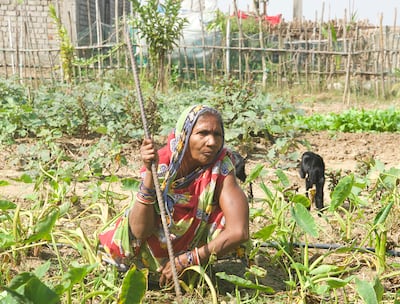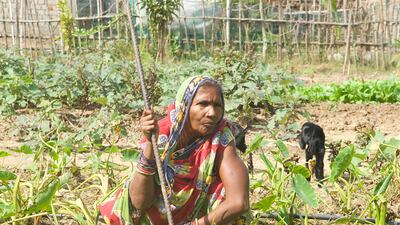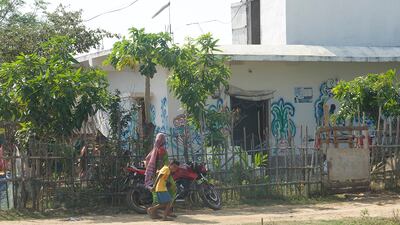At India's first resettlement colony for people displaced by climate change, women make up the vast majority of the population. The men in their families – husbands, brothers and sons – have all been forced to migrate to other states in search of work.
Manjulata Bijourli moved to Bagapatia with her family after rising sea levels led her quaint village to be submerged. While her husband remains at the colony, their two sons have moved away to find work.
“It is very painful to live without them,” Ms Bijourli told The National.
“They left one after another to work in other states. They work hard so that we can survive. Our lives have changed after our house was broken by the sea. We live in penury,” she said

For decades, about 577 families lived in Satabhaya, a cluster of seven villages on the 17km stretch on the Bay of Bengal. But after a cyclonic storm in 1999, the villages started experiencing rapid erosion of the shore.
In the last two decades, the rising seawater has advanced more than 1km and swallowed all but one of the villages. The erosion has wiped out more than 1,000 homes and large tracts of agricultural land.
The devastation was such that villagers, including Ms Bijourli, feared losing their lives.
In 2016, after repeated pleas from villagers, the government set up the country’s first colony for climate change victims in Bagapatia, 10km from the sea.
One hundred acres of marshland, previously used for prawn farming, was converted, and each family was given about 400 square metres of land and 150,000 rupees ($1,800) to build a house.

Despite the government aid, most of the families in the colony have not been able to afford to build concrete houses.
They have built brick walls and thatched roofs, but almost all of the houses are unfinished. The floors are plastered with clay and there is no direct water supply.
The marshland is unsuitable for agriculture, although a kitchen garden covers more than half of the land, where certain vegetables can be grown.
“Earlier we ate fresh fish and crabs. We had trees and plants. Now we have to buy everything – gas cylinders for cooking, fish, vegetables,” Ms Bijourli said.
“All the men in the village are gone. My neighbours’ sons are also there. There are no young men to look after us here,” she said.

Most families in Satabhaya were involved in agriculture and fishing. They also collected honey and reared cattle. But since the forced relocation, they have lost their traditional livelihoods.
To make ends meet, the men migrate to the southern states of Kerala and Tamil Nadu, where they mostly work as labourers in plywood factories.
As many as 200 men over 22 from the colony are working outside the state, Prasanna Parida, the head of the colony, told The National.
Only young boys and old men are left, except for a few men who work for government institutions such as schools or local councils.
“We have no men here. The men from our community had never stepped out of the village earlier. However, after resettlement, there is not enough land for farming and the nearby river comes under a wildlife reserve, so fishing is not possible. They have to look for alternative work,” he said.

Kajol Moni Das lives with her husband, Mahadev Das, their three daughters-in-law and six grandchildren in a four-room house. Her four sons work in Kerala.
The family of 15 lived in a big mud house and owned farmland. But they had to take a loan to build the house and are now left with debts of 1.5 million rupees.
“We took a debt to build extra rooms so we all can fit here. We are yet to recover from the loan. And then the cost of living is an added burden,” she said.
“My sons work very hard. They send us 8,000 rupees every month. They send us money so we can eat rice. We do not like it but what else can we do?”
The emotional toll of losing their ancestral homes and then living without family is equally painful for the men.
For decades, the men in Satabhaya were traditionally fishermen or farmers. But relocation meant they had to look for other means of employment and learn new skills, Sameer Sahani said. He came home after six months for holidays.

Mr Sahani, 32, moved to the colony six years ago with his parents, wife, and two sons after his 20-acre farm was flooded with salt water.
“I was very happy in Satabhaya. We lived in isolation. The village was in the middle of the jungle. Even if we did not eat, we were happy. I miss that life. I enjoyed fishing.”
“The sea gradually moved towards the house. It was 3km or 4km away. The salt got inside the farms. The seawater destroyed our lives. Now, I have to work as a labourer. I do not like it but our life is not the same any more,” he said.
The forced separation also takes a toll on the women's mental health, who have to look after their old, ailing in-laws and young children alone.
“I take care of my mother-in-law alone. She suffered from a brain stroke and is immobile. My father-in-law is too old and frail and then I have to look after the needs of the children, their food, education. And there is always a lingering concern for his health, what he eats, how he is living. It gets exhausting. I miss my husband and feel alone at times,” Mr Sahani's wife, Sumathee, said.


















